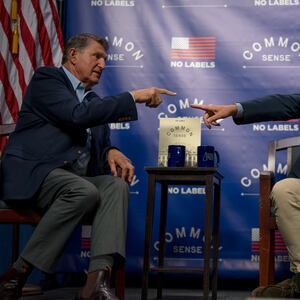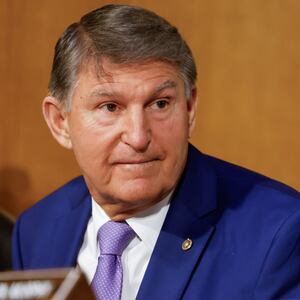Welcome to Trail Mix, your 2024 election sanity guide. See something interesting on the trail? Email me at jake.lahut@thedailybeast.com.
This week, we go behind the scenes for a look at what the next month will look like for Nikki Haley. Plus, some exclusive reporting on No Labels’ next move.
SO YOU’RE TELLING ME THERE’S A CHANCE?
If you ask Donald Trump, the 2024 Republican primary is already over: Nikki Haley should have already dropped out, and President Joe Biden is functionally a lame duck.
But Haley’s campaign is marching on after a third-place finish in Iowa and an 11-point defeat in New Hampshire. And if you follow the logic of Haley’s team, that makes sense. Even if there are few reasons for optimism for the only remaining Trump challenger in the race, there may not be many reasons for outright doomerism, either.
Ahead of her potential last stand in the Feb. 24 primary in her home state of South Carolina, there’s a case that the Haley campaign can make to donors and potential supporters which only Trump could render remotely plausible.
While the former president is on track to secure the GOP nomination, he’s also on track to face four separate criminal trials, resulting from his 91 separate felony charges, each of which could lead to a conviction.
That historic and unprecedented outcome would be unlikely before March 5, when 15 states hold their “Super Tuesday” primaries that could hand Trump the nomination outright. But that doesn’t mean influential Republicans aren’t thinking about it right now.

Republican presidential candidate Nikki Haley visits a polling place with New Hampshire Governor Chris Sununu and retired General Don Bolduc.
Brian Snyder/Reuters“Now if you’re talking to donors,” a former Trump administration official told The Daily Beast, “they understand that, and they understand the incredibly strange dynamic we’re in where second place matters if first place goes to jail.”
A source close to the Haley campaign who was with the candidate at her private reception on primary night in New Hampshire laid out the theory of the case for why Haley should hang in the race.
If Haley can sustain her campaign, at some point, Trump will stumble—legal developments will arise, and the campaign will be able to pounce in a way they weren’t able to when the primary was more crowded.
“Coming out of New Hampshire, she basically earned the right to get her message out for at least another month, maybe longer than that,” the source close to the Haley campaign said. “There are a lot of things in flux, and as soon as people start to see more of Nikki, I think she’s offering a real credible alternative and could build up some steam here if she has a really good showing in her home state.”
Crucially, that will depend on kicking Trump when he’s down—something Haley has been hesitant to do thus far unless the former president attacks her directly.
“There are going to be news cycles between now and the other primaries that are gonna create content and opportunity to change the narrative and hit Donald Trump,” the Haley supporter said. “So she’s gonna need the resources to do that.”
After falling short of expectations for an upset win in New Hampshire, or even a close defeat—both of which Haley’s allies teased—the mood in the candidate’s orbit has taken a hit. But the remaining uncertainty around Trump’s legal travails has kept some degree of hope alive.
Haley’s return to South Carolina on Wednesday night seemed to energize her supporters.
The New Hampshire result was “not what we expected,” Haley backer Rep. Ralph Norman (R-SC) told The Daily Beast on Wednesday. But his spirits picked up once he joined the former governor for an event in Charleston that night.
“UNBELIEVABLE!!” Norman told The Daily Beast in a text message. “Over 800 in attendance!! She’s in for the long haul!!”
Still, many polls show Trump far ahead in South Carolina, despite Haley’s long record in the state. It’s left some Haley sympathizers wondering if the effort to pitch her to New Hampshire’s independent voters might have rendered her toxic for the long haul.
“The bleak part of the equation is that she was portrayed as a media darling running against Donald Trump, painted as a moderate, painted as an independent,” the former Trump administration official who’s been supportive of Haley told The Daily Beast. “Those are all aspects Republican base voters absolutely detest.”

Rep. Marjorie Taylor Greene, former Republican presidential candidates Vivek Ramaswamy and Sen. Tim Scott, along with Eric Trump and his wife Lara, flank former President and Republican presidential candidate Donald Trump during a New Hampshire presidential primary election night watch party.
Elizabeth Frantz/ReutersThe Trump alumnus said New Hampshire showed how Haley has a clear strength among the type of independent and moderate voters who decide general elections, “but what she lacks is that love from the Republican and MAGA base, from those who will ultimately decide the nomination.”
With a long month ahead until South Carolina, Haley will need to keep campaign costs low as she seeks continued donor support. But her supporters say that won’t be hard for the former governor.
When asked about the best justification for her staying in the race, the source close to the Haley campaign emphasized that she wasn’t in an existential money situation. “She has run a relatively frugal ground game,” the source said.
Indeed, Haley’s supporters are quick to praise her for running a thrifty campaign; it usually doesn’t take long for someone to bring up how the campaign flew commercial on JetBlue and Spirit Airlines, or stayed at a lot of Residence Inns, despite the occasional luxury splurge.
The measures may all seem small on their own, but with Trump caught between court and a reduced rally schedule on the campaign trail, those in Haley’s corner think she can stick it out and hang with Trump longer than many outsiders think.
“I still think there’s a fighting chance,” a longtime Republican donor bundler told The Daily Beast. Contributors, the source said, are not all willing to wait until South Carolina votes before deciding to pull the plug.
“On the other hand, I have some people saying they’re gonna give her two weeks and it’s over,” this person said. “It’s sad.”
Still, Haley has a unique case to make to donors around Trump’s legal travails as she plans to hit the fundraising circuit in Manhattan and Los Angeles, as well as elsewhere in California and Texas, for around a dozen fundraising events between now and the South Carolina primary, according to the New York Post.
And according to Puck, Wednesday was the best-ever fundraising day for Stand For America, the outside super PAC backing Haley.
But it’s not all good news on the money front. Reid Hoffman, the billionaire co-founder of LinkedIn, is reportedly pausing any future donations to Haley as of Wednesday in what could be the first domino to fall, according to CNBC.
For now, Haley’s close advisers are projecting confidence. Norman, for one, said he remains confident donors will stay behind the candidate.
“Donors are behind her especially after Trump’s comments on ‘barring from the MAGA MOVEMENT’ anyone who gives to Nikki,” Norman said, referencing a Wednesday night post on Truth Social from the former president in which he said Haley donors would be “permanently barred from the MAGA camp.”
Underneath all the donor chatter, however, lies a tougher pill to swallow.
“Simply put: Republican voters love Trump,” the former Trump official said. “That’s it.”
—with reporting from Reese Gorman

Miguel Munoz, of Summerville, South Carolina, holds a placard as he and other supporters of former President Donald Trump gather outside a rally of Nikki Haley before the South Carolina Republican presidential primary election in North Charleston, South Carolina.
Randall Hill/ReutersSOME LABELS
In their quest to field a third party “common sense majority” presidential candidate in 2024, the centrist group No Labels is looking to an unusual—but perhaps unsurprising—source for backup: Republican officials.
According to audio obtained by The Daily Beast of a virtual meeting on Jan. 19, No Labels lawyer Dan Webb identified Republican state attorneys general as potential allies in their efforts to gain ballot access and put forward a viable national campaign.
In the virtual meeting with over 160 supporters of No Labels, Webb brought up the GOP attorneys general in the context of the unusual complaint that the group had filed with the U.S. Department of Justice the day before. They requested the feds investigate an alleged “racketeering conspiracy” meant to “subvert Americans voting rights, and shut down the organization's effort to secure ballot access in the 2024 presidential election.”
In their complaint, No Labels specifically mentioned groups like Third Way, the Lincoln Project, and MoveOn as the chief culprits in an alleged scheme to destroy the centrist effort by pressuring political operatives and firms to shun it, undercutting their plan to get on the 2024 ballot, and generally mobilizing opposition. (The groups involved reject those allegations.)
“If DOJ does not move forward as a full-scale investigation, what choices do we have?” Webb asked on the call. “Number one, we have had discussions and are considering going to state attorney generals.”
Webb went on to say that No Labels submitted the complaint first to the federal government “out of fairness,” but the next phase of the plan would be to give Republican AGs the same information “if DOJ won’t take action.”
Republican statewide politicians could very well be an eager audience for the group. A third-party centrist campaign, according to analysts and operatives, is more likely to siphon votes from Biden, not Trump.
With such tight margins in some states, many Trump foes fear a decent No Labels candidate could swing key electoral votes to Trump. Republican AGs are currently in office in battleground states like New Hampshire and Georgia.
Democrats, the group seems to have decided, will be of little help in enacting their general election plans.
“We’ve referred this matter to DOJ, and out of fairness,” Webb said, “we need to give them a little time to evaluate what they want to do, and we have to respect that.”
“No Labels will, at some point, depending on what happens and the facts to develop, that may very well mean that we would go to a Republican state attorney with the same evidence to ask them to move forward,” he continued.
Webb also said on the call that No Labels would need all the help it can get in securing ballot access—an expensive and necessary undertaking if their 2024 effort is to be serious at all.
So far, No Labels has only been able to secure access in 13 states, though those states include the battlegrounds of Arizona, Nevada, and North Carolina. The group is also pushing for ballot access in 14 more states, according to their website.
Republican attorneys general would be able to use state resources to move through any challenges the group may face, with Webb noting “the idea that No Labels would devote enormous financial resources to pursuing civil litigation, where because of the way civil litigation moves slowly, it may not be we may spend a lot of money and get no results and time to be very productive.”
No Labels did not return a request for comment on Webb’s remarks.
The basic argument in the complaint from No Labels is summed up in a video submitted as evidence to the feds, which quotes its co-founder Holly Page alleging an unnamed individual from the Lincoln Project told her “the forces aligned against us would make sure that if I continued with my work, I would never work in politics again and we would ‘get it with both barrels.’” (The Lincoln Project hit back by accusing No Labels of trying to “weaponize the DOJ.”)
Although the deep-pocketed and secretive group is not close to picking who that candidate might be, a number of names for potential candidates have been thrown out. Sen. Joe Manchin (D-WV) has spoken at events under the No Labels banner, though his appearance in New Hampshire last summer exposed the group’s lack of readiness for 2024.
While No Labels complains about a secret conspiracy to stop their efforts, the group has steadfastly resisted to reveal any information about the donors fueling its 2024 campaign. As long as No Labels spends less than half their money on political activities, the group continues to enjoy nonprofit status and the added perks of hiding the identities of its donors under federal law.
During another private No Labels call on Wednesday, Ruy Teixeira—a veteran political scientist unaffiliated with the group—expressed optimism that a unity ticket could be popular.
According to audio of the call obtained by The Daily Beast, Teixeira said a No Labels ticket “could win,” but he quickly added “I’m very skeptical” and alluded to concerns they could hand Trump the presidency.
“The political realist take on this is that, you know, that ain’t going to happen,” he said. “And it does create certain potential knock-on effects, which would be undesirable.”
FEELINGS DON’T CARE ABOUT YOUR FACTS
There’s a subset of Republican primary voters with whom Haley did remarkably well in Iowa and New Hampshire—and her success with them might distill why she won’t win the GOP primary.
According to CNN exit polls, 76 percent of New Hampshire primary voters who believe Biden legitimately won the 2020 election cast their ballot for Haley, while only 22 percent of those voters went for Trump.
There was a similar breakdown in Iowa, even though Haley placed third in the caucus, per CNN entrance polls. Haley won 53 percent of caucus goers who understand that Trump lost in 2020, while Trump only won 11 percent of them.
The problem for Haley is that voters who acknowledge this basic, fundamental fact make up a minority of the GOP primary electorate. Even in relatively independent-leaning and MAGA-skeptical New Hampshire, 51 percent of primary voters on Tuesday told CNN they believe Biden did not legitimately win the 2020 election.
In conservative and Trump-loving Iowa, the numbers are even starker: two-thirds of caucus goers told CNN they believe the 2020 election was stolen from Trump.
Perhaps unsurprisingly, Haley performed worse among these voters than Trump did among voters who believe he actually lost in 2020. In New Hampshire, 85 percent of election denying primary voters went for Trump, while only 13 percent went for Haley. In Iowa, the split was 69 percent for Trump and just 5 percent for Haley.
During this primary campaign, the former U.N. ambassador has hardly run as a 2020 truth-teller in the mold of Chris Christie, who dropped out before New Hampshire. But at times, and particularly if asked directly by a voter, she has made her feelings clear on Trump’s election denialism and the Jan. 6 attack on the Capitol.
Ahead of the Iowa caucus, Haley told a crowd at a town hall there that Trump lost the 2020 election, and said Jan. 6 “was not a beautiful day, it was a terrible day, and we don’t ever want that to happen again.”
While her statements are factual, most Republican politicians don’t clear that basic bar—ensuring that Haley, even with her modest remarks, is being embraced by non-MAGA Republicans and shunned by MAGA Republicans.
—reported by Sam Brodey

Republican presidential candidate Nikki Haley takes a selfie with her supporters during a campaign event before the South Carolina Republican presidential primary election in North Charleston, South Carolina.
Randall Hill/ReutersOFF THE BEATEN PATH
Not something you see every day. In a strange final twist to the Haley campaign in New Hampshire, a fixture of Republican watch parties was missing on primary night. Fox News, which both Haley and Ron DeSantis criticized for treating Trump with kid gloves, was nowhere to be found on the TVs and projectors around Haley HQ.
Instead, the Haley campaign played CNN’s election night broadcast as the results came in. The screens went dark, however, right as the race was being called and supporters filed into the main ballroom for Haley’s speech.
Debunking the debanking. A new favored talking point for Trump on the trail focuses on supporters getting “debanked” by the federal government over any involvement in the Jan. 6 insurrection. Trump raised eyebrows online during his speech in Portsmouth, New Hampshire, last Wednesday when he said, “We’re also going to place strong protections to stop banks and regulators from trying to de-bank you from your ... your political beliefs, what they do.”
Trump was referring to FinCEN, the financial crimes unit within the Treasury Department, which can use a variety of keywords to track down banking transactions potentially connected to domestic terrorism. Sen. Tim Scott (R-SC) who endorsed Trump last week, has described the keyword searches used by FinCEN “a flagrant violation of Americans’ privacy,” questioning how long they would be able to pull the data. One small problem for Scott—he voted for the bill which codified the practice. What’s more, the search terms aren’t just related to Trump supporters, but can also include “White Power,” “Camp Auschwitz,” “Antifa,” “Proud B,” “Storm, the,” “Capitol,” “Groyper Army,” “Threepers,” “boogaloo,” “civil war,” “last sons,” “kill,” “shoot,” “gun,” “death,” “murder,” “Biden,” “Kamala,” “Pelosi,” “Schumer” and “Pence.”
The former president has taken an interest in a variety of newly emerging financial policies recently, including his opposition to a central bank digital currency. At Trump’s rally in New Hampshire on Monday night, he all but said Vivek Ramaswamy made him mention it.
Dean on the move. Rep. Dean Phillips (D-MN) failed to crack 20 percent in the New Hampshire Democratic primary—which Biden won without appearing on the ballot—but he isn’t done campaigning yet. He’ll be campaigning in South Carolina over the weekend and then onto Michigan next week, according to his campaign.
CAMPAIGN LIT
When They Go Low. Democrats on the House Oversight Committee have begun to embrace a new approach to the GOP’s Hunter Biden antics, decorum be damned, Riley Rogerson reports.
Trouble with ‘Pastor Brad.’ House Speaker Mike Johnson’s relationship to a pastor with some serious money problems gets unearthed by Roger Sollenberger in this week’s Pay Dirt.
Tired of winning. In the one county Trump lost in Iowa, the campaign’s regional political director was left off the flight back to New York and informed their contract wouldn’t be renewed, The New York Times’ Shane Goldmacher, Jonathan Swan and Maggie Haberman report.
No credentials for you. Abby Vesoulis of Mother Jones details how both the Trump and Haley campaigns barred media outlets from their events during primary week in New Hampshire.
The GOP’s three genders. A super PAC supporting Montana Senate candidate Tim Sheehy presented voters in a survey with three gender descriptors: “male,” “working woman,” and “homemaker,” Grace Panetta of The 19th reports.













